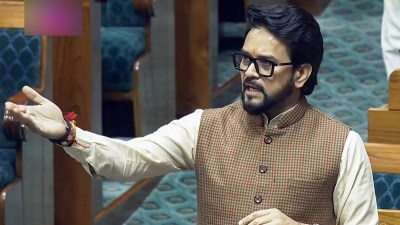IN LESS than a year since India enforced a strict quality control order (QCO) in April on viscose staple fibre (VSF), a key raw material in the textiles supply chain, its imports dropped 65 per cent, helped Aditya Birla Group-owned Grasim Industries consolidate its market share to 95 per cent from 90 per cent, and has started hurting the operations of small and medium sized spinning mills since it restricted access to cheaper raw material imports.
A QCO is a non-tariff trade barrier that bars manufacturers, importers, and distributors from storing or selling a product without a licence from BIS that certifies specific quality standards being met. Grasim Industries, the largest VSF producer, had about 18 months before the QCO, lobbied the Ministry of Textiles complaining of substandard imports from Indonesia and China.

Since the QCO was imposed, midstream VSF buyers like small- and medium-sized spinning mills have repeatedly raised concerns with the textiles ministry that such orders have held them back from cheaper VSF, which otherwise, helped them competitively export spun yarn and fabric. For MSME mills, these challenges come at a time when the textiles industry is reeling from a prolonged period of economic distress due to weak global demand.
They also allege that Grasim is delaying the production of certain specialty VSF variants unavailable in the domestic market and engaging in unfair trade practices by giving arbitrary discounts and dealing with select buyers. In August, 2021, the Competition Commission of India (CCI) issued an order stating that Grasim had abused its dominant position in the VSF market “by charging discriminatory prices to its customers, denying market access and imposing supplementary obligations upon its customers”. Grasim had appealed the order before the National Company Law Appellate Tribunal (NCLAT) and the case is currently ongoing.
In a letter to the textiles ministry, included in documents accessed by The Indian Express through the RTI, Grasim has dismissed concerns raised by MSME mills as a “mischievous complaint by the vested interest group… more like a propaganda to malign the domestic industry at (the) behest of foreign suppliers”.
“The QCO process has been driven by the Government of India and cuts across products in a bid to boost India’s manufacturing competitiveness… There are more than 650 QCOs… The implementation of QCO holds significant importance in regulating the influx of sub-quality and cheaper imports to ensure customers get quality products… A QCO is already in place for polyester, jute and cotton, to name a few and the rest are work in progress,” said a spokesperson from Birla Cellulose, a unit of Grasim, when sought for comments.
The Ministry of Textiles and the Bureau of Indian Standards (BIS) did not respond to emails asking for comments.
Story continues below this ad
In September, 2021, Dilip Gaur, the then managing director of Grasim, Aditya Birla Group’s flagship company, met Union Minister of Textiles Piyush Goyal and the company requested the textiles ministry to “kindly regulate the imports of such sub-standard VSF products from China & Indonesia by mandating the BIS Certification for complying to BIS VSF Standard”, according to file notings obtained through RTI.
VSF is a semi-synthetic fibre made with cellulose and is used widely in the textiles industry. Following the meeting, Goyal, who is also the Union Minister of Commerce and Industry, “asked to support the BIS issue”, a file noting made by an official in the textiles ministry revealed. Goyal’s office did not respond to an email asking for comments.
Grasim’s Gaur met with Goyal less than a month after an anti-dumping duty (ADD) on VSF, which had been enforced for eleven years, was removed by the Department of Revenue in August, 2021. The ADD was first recommended in 2010 by the Directorate General of Trade Remedies (DGTR) under the commerce ministry, when Grasim initiated an anti-dumping case against VSF producers in Indonesia and China.
The removal of ADD in the middle of FY22 led to a surge in VSF imports, which grew by 92 per cent in FY23 to Rs 2,033 crore compared to Rs 1,058 crore in the previous financial year, official trade data shows. In the earnings call for Q3FY23, Grasim’s HK Agarwal, who replaced Gaur in December 2021, said Indonesian suppliers “have been trying to get market share in India so they are giving aggressive prices… So, we have to contend with that and adjust our pricing accordingly. We cannot also lose market share beyond a point to any imports”.
Story continues below this ad
Agarwal had noted during an earlier earnings call that “total imports in FY22 have been around 90,000 tonnes, something like 7,500 tonnes per month and it is roughly about 10-11% of the total market”. Notably, both CCI in its 2021 order and DGTR in its anti-dumping investigation found Grasim to be the “sole producer” of VSF in the country. In other words, Grasim’s share in India’s VSF market was 89-90 per cent in FY22.
In April 2023, the Central Board of Indirect Taxes and Customs (CBIC) started implementing the QCO, allowing VSF imports into India from only those producers approved by BIS.
Between April and December, 2023, India’s VSF imports fell 65 per cent to Rs 582 crore compared with previous year. During the same period in FY23, India imported VSF worth Rs 524 crore from Indonesia, the largest source of VSF imports until the implementation of the QCO, compared to less than Rs 4 crore in FY24, a 99 per cent drop.
Assessing Grasim’s performance in the first quarter of FY24, which coincided with the first three months of the QCO’s implementation, Agarwal said in the latest quarterly earnings call, “Currently, we have a market share of close to 95% because the imports are not taking place… because BIS has introduced quality control order.”
Story continues below this ad
Up until now, BIS has granted licences to only seven production units under its VSF standard, four in India and three abroad, according to details on its website. Without a licence, both domestic and foreign producers are prohibited from selling VSF in the Indian market. All four domestic units with BIS licences are owned by Grasim and all three foreign units are owned by Austria-based Lenzing AG. In September last year, BIS confirmed to the textiles ministry that it had received a total of ten applications from VSF exporters in the UK, Austria, Indonesia, Thailand, and China, a file noting revealed.
Industry representatives have argued that QCOs on raw materials should be reversed and instead be enforced on finished products only. “The Indian Government could have commenced the enforcement of Quality Control Orders from the finished goods as done for technical textiles rather than raw materials…,” noted Dr K V Srinivasan, president of the Zurich-based International Textile Manufacturers Federation, in December last year.
ExplainedNeed for tariff re-balance
Barriers to imports — tariff or non-tariff — more often than not end up making domestic industry uncompetitive. In the case of viscose, it is also hurting small textile players including spinning mills who earlier had access to this raw material via cheaper imports, and could export yarn and fabric.
Moreover, the VSF QCO bundled all different variants of viscose fibre under one category. This posed additional challenges for spinners who have alleged that Grasim does not produce all kinds of VSF, including variants like EcoVero, Tencel, A100, and Refibra, as mentioned in letters sent by industry stakeholders to the textiles ministry. “The allegations are baseless and mostly all equivalent VSF variants are available in the market,” the spokesperson from Birla Cellulose said.
Furthermore, industry representatives have also accused Grasim of following unfair trade practices by prioritising select buyers, offering arbitrary discounts, and signing varying sales contracts. In August, 2021, CCI had issued an order in which it concluded that Grasim “abused its dominant position in the relevant market of ‘the market for the supply of VSF to spinners in India’ by charging discriminatory prices to its customers, denying market access and imposing supplementary obligations upon its customers”.
Story continues below this ad
“The matter is in public domain but is sub-judice. We don’t normally comment on such matters. However, Grasim has filed an appeal against the said Order before the National Company Law Appellate Tribunal, New Delhi on the grounds, inter alia, that the CCI had erroneously determined the ‘relevant market’ which led to the incorrect finding for Grasim having a dominant position. Grasim has challenged the said order before NCLAT and it is currently pending,” the spokesperson from Birla Cellulose said.
In FY23, Grasim raked in revenue worth Rs 15,142 crore through the sale of viscose fibre and yarn, 56 per cent of its total operating revenue and up by 24 per cent from FY22.

































